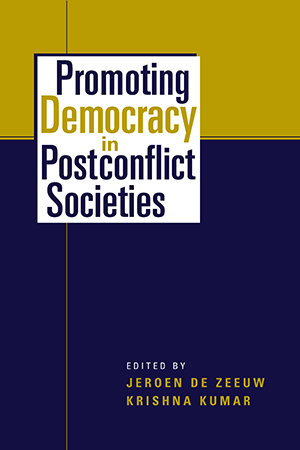Few would dispute the importance of donating funds and expertise to conflict-ridden societies—but such aid, however well meant, often fails to have the intended effect. This study critically evaluates international democratization assistance in postconflict societies to discern what has worked, what has not, and how aid programs can be designed to have a more positive impact.
The authors offer a unique recipient perspective as they explore three dimensions of democracy promotion: elections, free media, and human rights. Drawing on the experiences of Afghanistan, Cambodia, El Salvador, Ethiopia, Guatemala, Mozambique, Rwanda, Sierra Leone, and Uganda, they suggest concrete ways in which the international community can better foster democratization in the wake of conflict.
Jeroen de Zeeuw is a social development specialist at Timu Community Development Associates. Krishna Kumar is senior evaluation adviser in the Office of Foreign Assistance Resources, US Department of State. His recent books include Rebuilding Societies After Civil War: Critical Roles for International Assistance and Postconflict Elections, Democratization and International Assistance.
No rights in South Asia."All chapters are rich in detail.... This volume contributes with important knowledge on democracy assistance."—Helga Malmin Binningsbø, Journal of Peace Research
"Through a series of frank, incisive country case studies, this valuable volume takes the measure of international democracy assistance in postconflict countries."—Thomas Carothers, Carnegie Endowment for International Peace
"This unique volume offers valuable lessons concerning what the international community can and cannot do to assist democracy building in postconflict situations, as well as authoritative recommendations for how to do it better."—Peter Burnell, University of Warwick
"An engaging set of case studies, rich in detail and accessibly written, that underscore the complicated and challenging nature of war-to-democracy transitions."—Timothy D. Sisk, University of Denver






